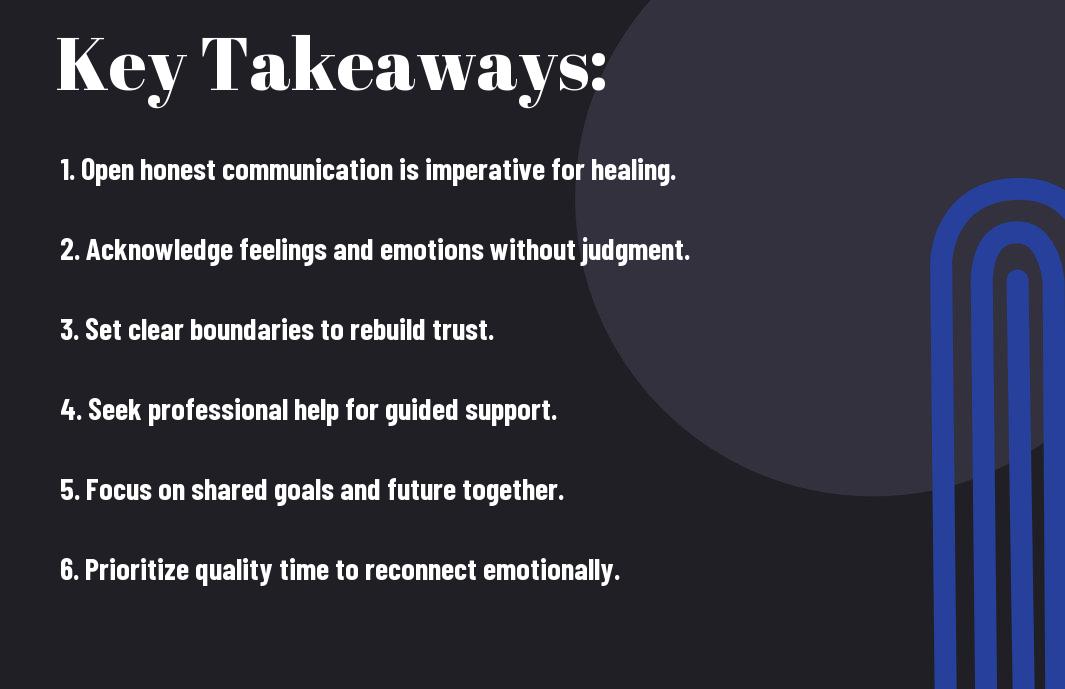Many couples find themselves in the painful situation of infidelity, but you can take decisive action to stop an affair and heal your marriage quickly. Knowing how to navigate the emotional turmoil is important, as well as understanding the steps needed to rebuild trust and connection. In this guide, you will learn practical strategies to confront the issue, communicate effectively with your partner, and reignite the love and commitment that once defined your relationship. Take the first step towards a healthier, happier marriage today!

Key Takeaways:
- Open communication is vital; both partners must express their feelings and concerns honestly to rebuild trust.
- Establish boundaries to create a safe space for both partners, defining what is acceptable and what is not.
- Seek professional help if necessary; couples therapy can provide guidance and strategies to navigate the healing process.
- Focus on rebuilding intimacy by spending quality time together and engaging in activities that strengthen your bond.
- Take responsibility for one’s actions and avoid blaming the other partner; accountability is key in moving forward.
- Develop a plan for the future; setting goals together can provide direction and foster a sense of teamwork in the relationship.
- Practice forgiveness—for both yourself and your partner—to allow for healing and to prevent lingering resentment.

Understanding the Impact of an Affair
For many couples, the discovery of an affair can feel like the ground has shifted beneath them. The emotional fallout often creates a profound sense of betrayal, leading partners to question their relationship’s foundation. Understanding the impact of an affair is vital for you as you navigate through this painful experience and seek ways to repair and rebuild your marriage.
Emotional Consequences
By engaging in an affair, you may experience a whirlwind of emotional consequences that can leave lasting scars. Feelings of guilt, shame, and confusion can cloud your judgment, while your partner’s pain and betrayal can evoke deep sadness and anger. Addressing these emotions openly is crucial for healing and restoring your connection with one another.
Trust Issues
Issues surrounding trust are among the most significant hurdles after an affair. The bond you once shared may now feel shattered, leaving you and your partner questioning each other’s intentions. Rebuilding trust takes time and effort, as both partners must work together to establish transparency and emotional safety. You will need to openly address your feelings and be willing to share your vulnerabilities while also being sensitive to your partner’s pain. Honesty and consistency in your actions are key components in fostering a renewed sense of trust as you move forward.
Acknowledging the Affair
The first step in healing your marriage is acknowledging the affair. This requires an honest confrontation of the situation, recognizing the hurt caused by your actions. Both partners must be willing to confront the reality of the affair, as this is crucial for rebuilding trust and moving forward. Without this acknowledgment, it is almost impossible to begin the process of repair and healing.
Open Communication
About initiating open communication, create a safe space where both you and your partner can express your feelings and fears. This dialogue should be honest and free from blame, allowing both parties to share their perspectives. Establishing this level of communication is crucial for understanding the motivations behind the affair and lays the groundwork for rebuilding your relationship.
Taking Responsibility
Beside open communication, taking responsibility for your actions is vital to the healing process. You must recognize the impact your decisions have had on your partner and your marriage, acknowledging not just the affair itself, but how it has contributed to your partner’s pain. Accepting accountability signals a commitment to change and can help in restoring trust.
Acknowledging your role in the affair requires you to reflect on the circumstances that led to your decisions. Admitting your mistakes is an important step towards rebuilding trust with your partner. By showing that you understand your actions have consequences, you demonstrate your willingness to commit to personal growth and a healthier relationship. Taking responsibility means more than just saying “I’m sorry”; it involves making conscious efforts to ensure that you learn from this experience and make significant changes in your behavior moving forward.

Rebuilding Trust
Despite the pain of betrayal, you can rebuild trust in your marriage through dedicated effort and communication. This process requires both partners to be committed to healing and understanding the underlying issues that led to the affair. By fostering an environment of support and empathy, you can slowly begin to mend the rift in your relationship and strengthen your emotional connection.
Transparency and Honesty
Trust can only be rebuilt through complete transparency and honesty. By openly discussing feelings, fears, and needs, you can create a safe space for both you and your partner. Addressing difficult topics and providing clarity about your actions will help to establish a stronger foundation of trust moving forward.
Setting Boundaries
Below, establish clear boundaries that respect each partner’s feelings and needs. It’s important for both you and your spouse to discuss what is acceptable and unacceptable in your relationship moving forward. This dialogue creates a shared understanding that will help rebuild your marital foundation.
A healthy relationship relies on defined boundaries to protect both partners. You should openly define what constitutes appropriate behavior to ensure you are both on the same page moving forward. By discussing specific situations that could potentially lead to misunderstandings, you can bolster each other’s feelings of security and strengthen your bond. Establishing these limits not only safeguards your relationship but also empowers you both to act with integrity, fostering a renewed sense of commitment and trust.
Seeking Professional Help
Not seeking professional help can prolong the pain caused by an affair. Working with a licensed therapist provides a safe space for both partners to express their feelings and helps you understand the underlying issues in your relationship. If you’re unsure where to start, consider consulting this resource on How to Save Your Marriage After You Cheated on Your Wife to guide you through the healing process.
Therapy Options
For many couples, engaging in couples therapy can be an effective first step towards rebuilding trust and intimacy. A qualified therapist will help you navigate your complex emotions and offer tools to improve communication, ultimately guiding you both through the healing journey.
Support Groups
Besides therapy, joining support groups can provide additional encouragement and understanding. Sharing your experiences with others who have faced similar situations can be both comforting and enlightening, helping you and your partner feel less alone in your struggles.
Plus, support groups often foster a sense of community and connection, which is important during tough times. Within these groups, you can share both the negative and positive experiences, gaining insights from others’ journeys. This can help you identify patterns of thought and behavior that may be affecting your marriage. Being part of a supportive network can reinforce your commitment and motivate you to work through the painful emotions together, enhancing your chances for a successful recovery and renewed relationship.
Strengthening Your Relationship
After addressing the underlying issues of your affair, it’s imperative to focus on strengthening your relationship. This involves open communication, trust rebuilding, and creating new, positive experiences together. You must prioritize the bond between you and your partner, ensuring both of you feel valued and understood. Investing effort into your relationship can lead to a more resilient connection, ultimately reducing the risk of future conflicts and misunderstandings.
Quality Time Together
Below are simple yet effective ways to establish quality time together, allowing you and your partner to reconnect. Schedule regular date nights, engage in shared hobbies, and participate in meaningful conversations. By fostering an environment where both of you can enjoy each other’s company, you cultivate a stronger emotional connection that nurtures your relationship.
Rediscovering Intimacy
After working on these foundational aspects, it’s important to focus on rediscovering intimacy. This involves more than just physical connection; it encompasses emotional vulnerability, affection, and genuine appreciation for each other. Take time to understand your partner’s needs and desires, as fostering a sense of safety will allow both of you to express yourselves more openly.
Another significant element of rediscovering intimacy is ensuring that both partners feel desired and emotionally connected. Explore new ways to express your love, whether through gentle touches, loving words, or surprising gestures. Creating an environment where both of you feel safe and cherished enhances intimacy significantly. Keep in mind that intimacy is a journey, and being patient while you explore it together will strengthen your relationship even further.
Creating a Future Together
Keep the momentum going by focusing on building a brighter future in your relationship. After acknowledging past hurts and misunderstandings, it’s important to actively work together to create shared dreams and goals that reinforce your commitment. Embracing this journey can strengthen your bond and create a more fulfilling partnership.
Setting Goals as a Couple
Among the many ways to fortify your relationship, setting mutual goals stands out. Work collaboratively to outline what you both desire for your future. This could include plans for activities, family aspirations, or financial objectives. By aligning your ambitions, you’ll enhance your partnership and foster a sense of unity.
Developing Shared Values
One effective way to solidify your relationship is to focus on developing shared values. This common ground acts as a guiding force in your marriage, influencing your decisions and interactions. When both partners are aligned in their beliefs and priorities, it fosters trust and understanding.
For instance, you might prioritize honesty, respect, and love as foundational values in your relationship. Establishing these shared principles can help you navigate conflicts more effectively while ensuring that both your needs and desires are met. By openly discussing what values matter most to each of you and committing to them, you’ll create a solid framework for making decisions together, resulting in a harmonious and resilient partnership. This shared commitment strengthens your emotional connection and can significantly enhance your relationship satisfaction.
Summing up
Taking this into account, to stop an affair and repair your marriage quickly, focus on open communication and rebuilding trust. Acknowledge the issues that led to the affair and commit to honesty with your partner. Take responsibility for your actions and prioritize quality time together to strengthen your connection. Seeking professional help through counseling can provide valuable insights and guidance. By being proactive and dedicated to healing your relationship, you can create a stronger, more resilient marriage moving forward.
FAQ
Q: How can I recognize if my partner is having an affair?
A: Signs of an affair can vary, but common indicators include unexpected changes in behavior, increased secrecy, shifts in emotional connection, or spending more time away from home. It’s crucial to address these concerns openly and communicate with your partner to express your feelings and seek transparency.
Q: What steps can I take to stop the affair immediately?
A: The first step is to confront the situation with compassion and honesty. Set boundaries with the other person involved, make it clear that the relationship is over, and communicate your commitment to your spouse. Finding a safe space to talk about your feelings and motivations can help both partners to engage in a constructive dialogue.
Q: How do I begin the process of repairing my marriage after an affair?
A: Repairing your marriage will require time, effort, and patience from both partners. Start by engaging in open discussions about the affair, expressing feelings of hurt, betrayal, and love. It may also be beneficial to seek marriage counseling to navigate these challenging conversations and work through underlying issues together.
Q: Can my marriage truly recover from an affair?
A: Recovery is very much possible, but it depends on the willingness of both partners to work through the pain and issues that led to the affair. Committing to rebuilding trust, improving communication, and nurturing the emotional connection can help in the healing process. Many couples emerge stronger after addressing their challenges together.
Q: What resources can help us during this challenging time?
A: There are numerous resources available to couples dealing with infidelity. Books on relationship healing, online forums for sharing experiences, and professional counseling and workshops can provide valuable insights and support. Focus on finding resources that resonate with both partners and encourage a mutual commitment to healing and growth.
